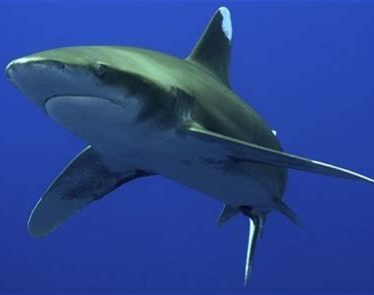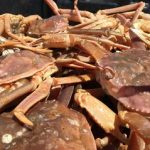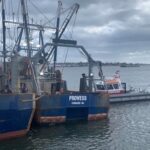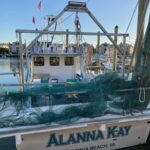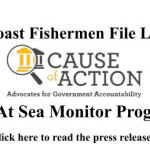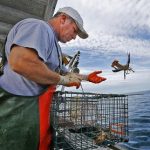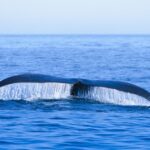Tag Archives: Endangered Species Act

Richard “Max” Strahan attempted to intervene in right whale case with court injunction
An animal rights activist made a late attempt to try and stop the industry from being allowed to use vertical buoy ropes. Richard “Max” Strahan tried to intervene at the beginning of the month in the federal right whale court case that holds the future of the lobster industry in its hands, but the activist’s attempt was rejected by a judge less than a week later. Strahan filed his motion on May 8 and claimed that the only way the industry would stop using the ropes is by a court-ordered injunction. >click to read< 16:03
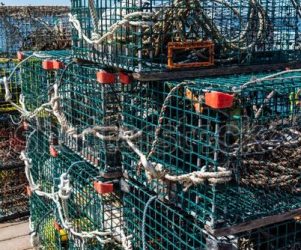
Massachusetts Marine Fisheries Advisory Commission bans inshore lobstering during whale migration
Meeting via webinar, the MFAC overwhelmingly approved five of the six recommendations presented by the state Division of Marine Fisheries, setting the stage for a hectic start to the state’s 2021 lobster fishing season.,, A Feb. 1 to May 15 closure to commercial trap gear in all state waters,, weaker buoy lines,, A Jan. 15 to May 15 gillnet closure in Cape Cod Bay,, All but one of the approved measures passed on unanimous 8-0 votes. The exception was the recommendation for the Feb. 1 to May 15 commercial trap gear closure in all state waters. The lone dissenting vote on the measure came from longtime Gloucester lobsterman Arthur “Sooky” Sawyer, “I can’t support this motion. The Massachusetts inshore lobster fishery has never killed a right whale. I’m voting no.” >click to read< 18:35
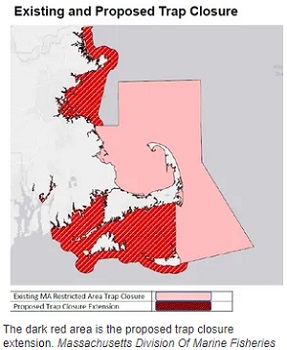
Livelihoods Threatened: Massachusetts lobstermen concerned about proposed regulations to protect whales
The Massachusetts Division of Marine Fisheries is proposing multiple amendments to current rules regulating fixed gear fisheries in an effort to protect an the North Atlantic right whale. Two local lobstermen say the proposed regulations threaten their livelihoods. “It’s gonna take roughly 30% of my income away from me,” said Dave Magee,,, Tom Tomkiewicz, a Fairhaven lobsterman, was not sold on the regulation, the regulations could cut 30% of his catch and up to 50% of his income,,, “All the bait guys, the marine supply guys, the shipyards, down to the restaurants we go to once or twice a week. We’re not going to be able to go because we won’t have the money. It’s going to affect a lot of people not even involved.” >click to read< 13:07
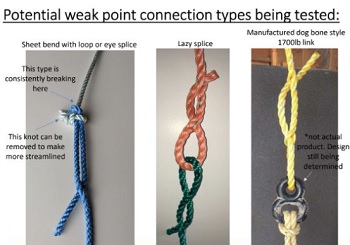
Recommended gear rules for Right Whale safety are adopted
With the National Oceanic Administration’s National Marine Fisheries Service (NMFS) under a fast approaching, court-imposed deadline to develop new whale protection rules, the Zone C Lobster Management Council held a special meeting last week to get an update on the situation from Department of Marine Resources Commissioner Patrick Keliher. The meeting was also an opportunity to consider a zone-specific plan for gear modifications that will likely be required by NMFS. As with many things occurring during the ongoing coronavirus pandemic, the meeting took place in cyberspace. >click to read< 14:43

Boasberg sets deadline for new North Atlantic Right Whale Protections no later than May 31, 2021
The Center for Biological Diversity, Conservation Law Foundation, Defenders of Wildlife and the Humane Society of the United States sued the federal government for violating the Endangered Species Act by allowing the lobster fishery to operate in a manner known to entangle right whales. U.S. District Court Judge James E. Boasberg also ordered a new ESA-mandated analysis of the American lobster fishery that takes into account the full scope of its harm to right whales. He stopped short of prohibiting lobster fishing with vertical buoy lines in a key right whale feeding area, which the groups had requested as an interim measure. >click to read< 07:15
Judge: Lobstering can proceed until new right whale protections are finalized in May – The right whale protection lawsuit winding its way through the federal courts for two years has often been called the “wild card” in the battle between environmental groups trying to save the critically endangered whale from extinction and Maine lobstermen trying to protect their way of life. >click to read< 17:24

Judge James Boasberg’s court ruling puts future of Maine lobster industry at risk
United States District Judge James Boasberg’s order found that the National Marine and Fishery Services violated the Endangered Species Act by licensing the lobster fishery. In the second phase of the case, the judge will decide what action is necessary to rectify the situation. The Maine Lobstermen’s Association, an intervenor, and other industry stakeholders around the Gulf of Maine, will submit information for the judge to consider in his ruling.,, Activist Richard Strahan filed a motion in federal court in Bangor to stop fishing in Maine May 15, citing violations of the Endangered Species Act, Maine Public reported. The Maine Department of Marine Resources has no intention of curtailing lobster permits, said spokesperson Jeff Nichols. >click to read< 09:45
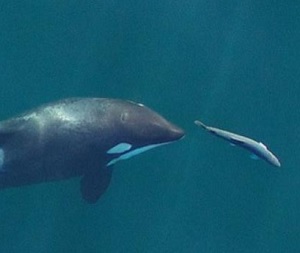
Judge weighs shutting down Southeast Alaska Chinook fishery
Fishermen in Southeast Alaska could see their season cut short if a federal judge issues an injunction requested by a Washington environmental group to protect the food supply of a subpopulation of orcas. The Wild Fish Conservancy filed a lawsuit against NOAA,,, “We are getting blamed for harvesting their food source, which really isn’t the cause of the problem,” Amy Daughery, executive director of the Alaska Trollers Association said. “The problem as we see it, is the exponential population growth in Seattle, which has lead to a lot of toxicity and pollution and habitat loss in that area. And so these whales are really struggling, this one population. The Northern killer whales that we see off the coast of Southeast Alaska are doing very well. In fact they’ve increased.” >click to read< 10:19
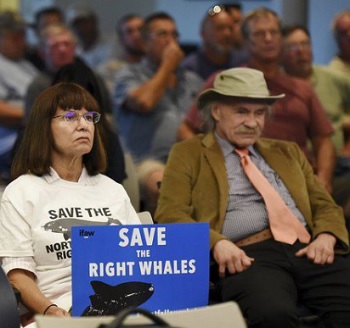
Activist Seeks Preliminary Injunction To Halt Lobster Fishing In Maine
There are new developments Friday in the legal battle over whether rope used by Maine lobstermen poses a deadly threat of entanglement to endangered North Atlantic right whales. Richard Strahan’s case is similar to one he brought in Massachusetts, where a federal judge ruled recently that the lobster fishery there violates the Endangered Species Act. Strahan says state governments and NOAA have deliberately ignored the law. In another case, a coalition of conservation groups late Friday filed their proposals for protecting the right whales. That’s after a judge’s finding that the federal government violated the Endangered Species Act by failing to stall the whales’ slide toward extinction. The Conservation Law Foundation and others say the judge should immediately bar use of vertical rope,,, >click to read< 11:42
Massachusetts Lobstermen push against whale rules – Aug 22, 2019 >click to read<

North Atlantic Right Whale: State must secure incidental take permit within 90 days to to avoid fishery closures
Last week, U.S. District Court Judge Indira Talwani said that Massachusetts has done the most of any state in the country to keep endangered North Atlantic right whales from becoming entangled in lobster pot and gillnet lines.,, In her April 30 decision, Talwani postponed ruling on closing fisheries, but gave the state just 90 days to obtain an incidental take permit under the Endangered Species Act from the National Oceanic and Atmospheric Administration. On Monday, a federal judge in Maine ruled that a similar suit could proceed, denying NOAA’s motion to dismiss. Both injunctions were brought forward by Richard “Max” Strahan, a longtime and controversial right whale activist with several prominent cases over the past two decades who sued under the Endangered Species Act. >click to read< 11:35
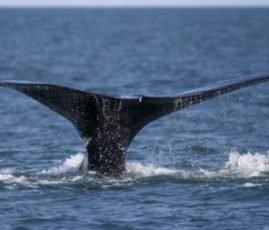
North Atlantic Right whale trouble: Lawsuit on protections could last for months
Environmental groups sued the U.S. government with a claim that regulators’ failure to protect the North Atlantic right whale from harm was a violation of the Endangered Species Act, and U.S. District Judge James Boasberg ruled April 9 that they were right. The government, environmentalists and industry members who are involved in the lawsuit must still return to court to determine a remedy. Boasberg ruled that the risk posed to the whales by the lobster fishery was too great to be sustainable, and that a remedy could ultimately result in new restrictions on lobster fishing. Members of the industry, including the Maine Lobstermen’s Association, have vowed to fight to protect the fishery. >click to read< 11:27

Court Finds American Lobster Fishery Requires Incidental Take Statement for Impacts on North Atlantic Right Whale
As commercial fisheries across the United States continue to adjust operations in the face of new legal requirements, such as the shift from single-species to ecosystem-based management, one challenge in particular has dominated the courts: the Endangered Species Act (ESA). Recent court decisions have vacated commercial longline fishing permits in federal waters off the coast of California that could endanger the Pacific leatherback sea turtle and restored prohibitions on gillnet fishing gear in a known New England feeding ground for the endangered North Atlantic right whale. This trend continued on April 9, when a federal district court judge in Center for Biological Diversity,,,The American lobster fishery is managed cooperatively by the Atlantic States Marine Fisheries Commission and NMFS, >click to read< 14:45
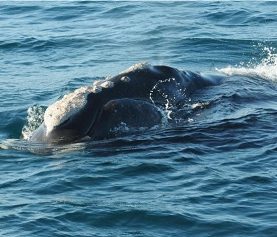
Ruling in whale case signals turmoil for lobster industry
It is too early to know exactly how the ruling in a lawsuit brought by a group of environmental organizations will affect the lobster industry. U.S. District Court Judge James Boasberg asked those groups and NOAA to file briefs suggesting an appropriate “injunctive remedy” against further violations of the Endangered Species Act. Whatever that remedy may be, it is likely to come soon and have a significant impact on Maine lobstermen. During the past several months, Department of Marine Resources Commissioner Patrick Keliher hosted a series of meetings along the coast with members of the lobster industry,, Throughout the process, Keliher warned that the pending federal lawsuit against NOAA was a “wild card” that could affect the regulatory process in undetermined ways. Last week, Keliher said that with the release of the court’s decision the wild card had been played. >click to read< 17:51
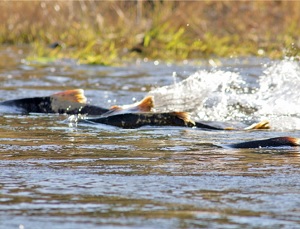
West Coast salmon season taking shape – Feds Look at Protections for Oregon Spring-Run Chinook Salmon
The Pacific Fishery Management Council has adopted ocean salmon season recommendations that provide recreational and commercial opportunities for most of the Pacific coast and achieve conservation goals for the numerous individual salmon stocks on the West Coast. >click to read< 17:25
Feds Look at Protections for Oregon Spring-Run Chinook Salmon -A petition seeking to extend federal wildlife protections to spring-run Chinook salmon found along Oregon’s coast has merit and could warrant listing the fish under the Endangered Species Act, Conservation groups Native Fish Society, the Center for Biological Diversity, and Umpqua Watersheds submitted a new petition in September 2019 specifically for spring-run salmon. >click you< 17:33

Lobstermen Question State Whale Plan at Waldoboro Meeting
Lobstermen expressed a mix of frustration and acceptance upon hearing the state’s new plan to protect North American right whales during a meeting in Waldoboro on Tuesday, Nov. 5. Maine Department of Marine Resources Commissioner Patrick Keliher presented the state’s proposed gear rules and fielded questions in the Medomak Middle School gymnasium. Photo’s >click to read< 09:55
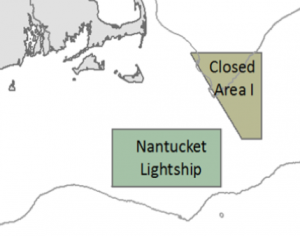
Gillnet Fishermen: Update on Closed Area 1 and Nantucket Lightship Closure Areas
On October 28, 2019, Federal District Court Judge James E. Boasberg issued an Order and Opinion on a lawsuit challenging a portion of the New England Fishery Management Council’s Omnibus Essential Fish Habitat Amendment 2. The Order prohibits NOAA Fisheries from allowing gillnet fishing in the former Nantucket Lightship Groundfish and Closed Area I Groundfish Closure Areas, until such time as NOAA Fisheries has fully complied with requirements of the Endangered Species Act,,, >click to read< 14:29

Federal Judge Restores Ban on Fishing Net That Entangles Whale Species
Environmentalists hoping to save the North Atlantic right whale won a federal injunction Monday banning walls of fishing net that entangle the species that has been on the brink of extinction since the 1970s. ,, The decision by U.S. District Judge James Boasberg speared changes made by the National Marine Fisheries Service earlier this year to rules governing New England’s fisheries. >click to read< 12:30
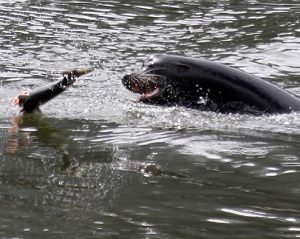
Proposal would kill more sea lions to protect fish
More than 1,100 sea lions could be killed annually along a stretch of the Columbia River on the Oregon-Washington border to boost faltering populations of salmon and steelhead, federal officials said Friday. The National Marine Fisheries Service said it’s taking public comments through Oct. 29 on the plan requested by Idaho, Oregon, Washington, and Native American tribes. The agency says billions of dollars on habitat restoration, fish passage at dams and other efforts have been spent in the three states in the last several decades to save 13 species of Columbia Basin salmon and steelhead protected under the Endangered Species Act. >click to read< 13:43
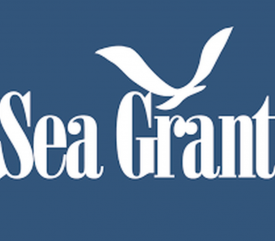
60-Day Notice of Intent to Sue NOAA under the Endangered Species Act Regarding Sea Grant’s Funding of Offshore Aquaculture Projects
Dear Secretary Ross, et al.: Friends of the Earth (“FOE”) and Center for Food Safety (“CFS”) hereby notify you of violations of the Endangered Species Act (“ESA”), 16 U.S.C. §§ 1531-1544, in connection with Project 107-NH-Chapman (“Project”), an offshore aquaculture project proposed by the University of New Hampshire and funded by a grant from the National Sea Grant College Program’s (“Sea Grant”) 2018 Ocean, Coastal, and Great Lakes National Aquaculture Initiative. The Project calls for the construction and deployment of an Aquafort system approximately 12 kilometers offshore in a depth of 52 meters of water. The Aquafort system consists of a floating >click to read<13:39
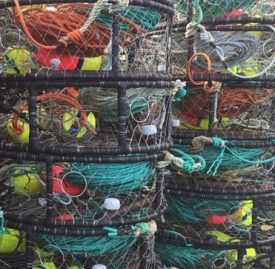
California’s whale protections must also protect crab fishing industry – Noah Oppenheim
At midnight Monday, California closed its springtime Dungeness crab fishing season coastwide, three months early. Hundreds of California crab fishermen and fisherwomen who rely on this fishery to feed their families will be off the water. They will have to find work elsewhere. Some may lose their livelihoods.,,, The ability of California fishermen to provide a seafood resource that the public rightfully owns is now even more constrained. >click to read<13:46
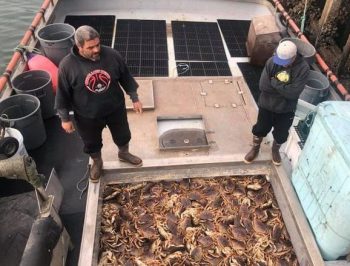
California Crabbers Could Feel the Pain, State Reaches Tentative Agreement With Enviro Group Over Whale Entanglement
The California Department of Fish and Wildlife and the Center for Biological Diversity have tentatively agreed to settle an ongoing lawsuit, which claims that the state’s lack of action in preventing whales from becoming entangled in commercial crabbing lines violates the Endangered Species Act.,,, The Center for Biological Diversity filed the suit in 2017 after a record number of entangled whales were observed off the coast of the Western United States between 2014 and 2016. >click to read<08:55
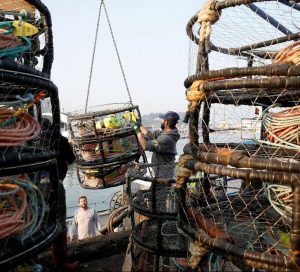
Crab fishermen and environmentalists square off over whale entanglements
The issue has pitted two local interest groups against each other: Those who depend on the $68 million California Dungeness crab fishery for their livelihood, and those who advocate shutting down areas to crabbing to protect humpback whales and other endangered species. Caught in between are everyday shoppers who love having Dungeness crab on their tables, but probably wouldn’t want marine mammals hurt in the process. “I’m frankly very scared of what the upcoming season could mean for whales,” said Kristen Monsell, senior attorney at the Center for Biological Diversity, an Oakland environmental group that sued the state over the issue last year. The case is due to go before a judge in February. >click to read<13:23
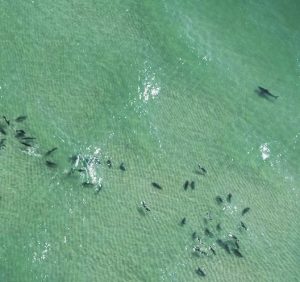
White sharks aren’t the issue. Gray seals are – amend the 1972 Marine Mammal Protection Act
Last summer’s white shark attacks off Cape Cod beaches, one resulting in the first human fatality in the state in over 80 years, highlight the fact that times change, our marine ecosystem is evolving, and laws need to adjust to these changing realities. However tragic those shark attacks are for the victims and their families, the white sharks are not the issue; they simply dramatize it. The ever-increasing population of gray seals is the issue.,, A realistic start to addressing this issue would be to amend the 1972 Marine Mammal Protection Act to provide for delisting recovered species, such as the gray seal. Admittedly, while delisting would not resolve the issues of controlling seal population growth or related white shark attacks, it would be a reasonable first step for the following reasons: >click to read<09:31

In Battle Over Whale, Judge Tears Up Agency Stonewalling
A federal judge opened the door Thursday for environmentalists to bolster claims over a lobster fishery they blame for the declining population of an endangered whale. Ordering the National Marine Fisheries Service to produce discovery, U.S. District Judge James Boasberg said the Endangered Species Act allows the agency’s challengers to use evidence outside the administrative record. “In order to accurately assess the alleged crisis of these cetaceans, the court will benefit from a record that reflects the actual, ongoing effects of the lobster fishery on the species,” the 16-page ruling says. The cetaceans at issue are called the North Atlantic right whale. There were roughly 455 right whales left as of 2016, and the Conservation Law Foundation says at least 18 of these have been killed since 2017. >click to read<16:28
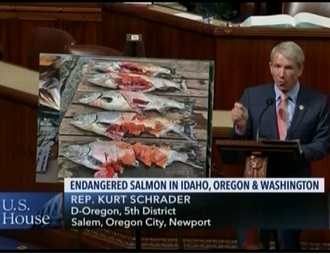
Congress must choose threatened salmon over sea lions
State, federal and local governments have spent too much time and money restoring fish runs in the Columbia River Basin to let those efforts go to waste. The U.S. House recognized this reality last month by passing legislation to make it easier to kill sea lions that feast on threatened salmon and steelhead in the Columbia River and its tributaries. Now, the Senate must step up and push the bill through to the finish line. Northwest senators must be unified in their support for this common-sense measure, which aims to safeguard the billions of dollars invested in preserving fish that are listed under the Endangered Species Act.>click to read<

Harvesters charged with killing Stellar sea lions
A commercial fisherman and his deckhand have been charged with harassing and killing 15 Steller sea lions found dead during the opening of the 2015 Copper River salmon fishery. Jon Nichols, 31, of Cordova, captain of the F/V Iron Hide, and deckhand Theodore “Teddy” Turgeon, 21, of Wasilla, are charged with harassing and killing the Steller sea lions with shotguns and then making false statements and obstructing the government’s investigation into their criminal activities, the U.S. Attorney’s office in Anchorage said April 19. >click to read<09:14

Lawsuit Challenges Trump Administration’s Failure to Protect Pacific Humpback Whales Threatened by Fishing Gear, Ship Strikes, Oil Spills
The Center for Biological Diversity, Turtle Island Restoration Network and Wishtoyo Foundation today sued the Trump administration for failing to protect humpback whale habitat in the Pacific Ocean, where the animals face threats from fisheries, ship strikes and oil spills. Today’s lawsuit, filed in federal district court in San Francisco, aims to force the National Marine Fisheries Service to follow the Endangered Species Act’s requirement to designate critical habitat within one year of listing a species as threatened or endangered and not authorize actions that,,, >click to read< 16:12
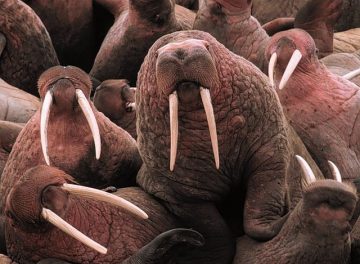
Feds Sued to Force Protection of Alaska’s Pacific Walrus
The Center for Biological Diversity sued the Trump administration Thursday over its denial of Endangered Species Act protection to the Pacific walrus. The lawsuit, filed in Anchorage federal court, challenges the October 2017 decision by the U.S. Fish and Wildlife Service finding the Pacific walrus does not warrant listing as a threatened or endangered under the Endangered Species Act. “The service’s listing decision deprives the walrus of the ESA protections which it is both entitled to and desperately needs,” the complaint states. >click to read<15:30

Suit by animal protection groups follows deaths of 17 right whales in Canadian and U.S. waters last year
Conservation and animal-protection groups have sued the National Marine Fisheries Service in the United States, alleging it failed to protect right whales from entanglement in commercial fishing gear. The lawsuit, which was filed in federal court in Washington, D.C., late last week, alleges the federal management of the U.S. lobster fishery violates the Endangered Species Act and the Marine Mammal Protection Act. The lawsuit seeks to force the National Marine Fisheries Service to do a sufficient examination of the fishery’s impact on North Atlantic right whales and adopt additional measures to prevent entanglements. >click here to read< 18:55

Lawsuit filed to save North Atlantic Right Whales from death in fishing gear
Today’s lawsuit against the National Marine Fisheries Service, filed in federal court in Washington, D.C., alleges that federal management of the American lobster fishery violates the Endangered Species Act and the Marine Mammal Protection Act. The lawsuit seeks to force the agency to sufficiently examine the fishery’s impacts on North Atlantic right whales and adopt additional measures to prevent more entanglements in the future. The lobster fishery is the most active fixed-gear fishery in the northeastern United States. >click here to read< 12:08 






